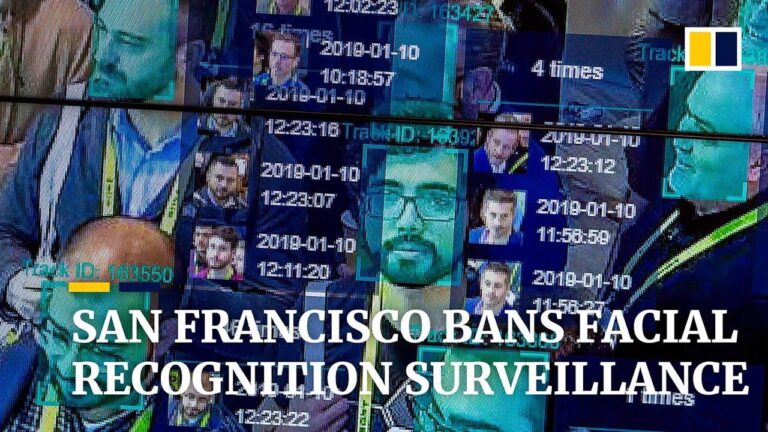San Francisco Leads the Way with Comprehensive Ban on Facial Recognition Technology
San Francisco has made a historic move by officially banning the use of facial recognition technology across all city government departments. This pioneering legislation, approved by the Board of Supervisors, aims to address growing concerns about privacy infringements, algorithmic inaccuracies, and the potential for civil rights violations. By taking this stance, San Francisco emerges as a trailblazer in the national conversation surrounding the ethical use of biometric surveillance tools and their implications for public safety and individual freedoms.
San Francisco’s Groundbreaking Prohibition on Facial Recognition
In an unprecedented action, San Francisco has become the first major U.S. city to implement a full ban on facial recognition technology within its municipal agencies. The decision stems from mounting evidence that such systems often suffer from racial and gender biases, leading to wrongful identifications and disproportionate targeting of minority communities. City officials emphasize that this ban not only protects privacy but also promotes equitable treatment and transparency in government operations.
Key components of the ordinance include:
- Complete disallowance of facial recognition software in law enforcement and city surveillance
- Mandatory publication of detailed reports on biometric data usage and handling
- Commitment to researching and adopting less intrusive technologies for public safety
| Department | Previous Application | Changes Due to Ban |
|---|---|---|
| Police Department | Identifying suspects through facial scans | Discontinues all facial recognition practices |
| Public Transit Authority | Monitoring security via automated systems | Reverts to human-led surveillance methods |
| City Administration | Controlling employee access with biometric verification | Adopts alternative authentication technologies |
Privacy Champions Celebrate as a Milestone for Civil Rights
Privacy advocates and civil liberties organizations have hailed San Francisco’s ban as a monumental victory in the fight against invasive surveillance. They argue that facial recognition technology poses significant threats to personal privacy, especially for vulnerable populations who are often misidentified due to biased algorithms. The ban is seen as a crucial step toward safeguarding anonymity in public spaces and preventing unlawful tracking or profiling.
Supporters highlight several critical advantages:
- Maintaining the right to remain anonymous in everyday environments
- Reducing the risk of discriminatory law enforcement practices
- Enhancing transparency and accountability in government surveillance
Experts believe this policy will inspire other municipalities to reconsider their use of biometric technologies, fostering a nationwide dialogue on balancing security with fundamental rights. Below is a summary of the primary benefits emphasized by privacy proponents:
| Benefit | Explanation |
|---|---|
| Protection of Personal Data | Prevents misuse and indefinite retention of sensitive biometric information |
| Mitigation of Algorithmic Bias | Addresses inaccuracies and discriminatory outcomes inherent in facial recognition systems |
| Upholding Civil Liberties | Defends citizens from unwarranted government surveillance and profiling |
Debate Over the Ban’s Effect on Law Enforcement Capabilities
Despite widespread support, critics argue that the prohibition could impede law enforcement’s efficiency in identifying suspects and preventing crime. San Francisco police have previously utilized facial recognition to expedite investigations, claiming it enhances public safety by quickly narrowing down suspect pools. Opponents warn that without these tools, officers may face longer investigation times and increased difficulty in verifying identities.
Law enforcement officials have pinpointed several challenges arising from the ban:
- Slower Response Times: Manual evidence review may delay case resolutions.
- Increased Resource Demands: More personnel might be needed to compensate for the loss of AI assistance, stretching budgets thin.
- Reliance on Eyewitness Testimony: Without technological support, suspect identification may become less reliable.
Nevertheless, city leaders stress that protecting privacy and civil rights must take precedence, encouraging innovation in alternative investigative methods that do not compromise individual freedoms.
Calls for Robust Oversight and Ethical Frameworks in Government Technology Use
As San Francisco enforces its facial recognition ban, experts advocate for the creation of clear, enforceable policies to regulate emerging technologies in public sectors. Without stringent oversight, there is a heightened risk of privacy breaches, unchecked surveillance, and perpetuation of systemic biases under the pretext of technological progress. The consensus among specialists is that while technology can enhance efficiency and security, it must operate within well-defined ethical boundaries.
Recommended measures to ensure responsible deployment include:
- Open Policy Development: Transparent disclosure of technology applications and limitations.
- Independent Audits: Regular third-party assessments to verify fairness and accuracy.
- Inclusive Community Input: Engaging diverse stakeholders in decision-making processes.
- Clear Accountability Structures: Establishing consequences for misuse or failures.
| Oversight Strategy | Objective |
|---|---|
| Transparency Reports | Foster public trust through regular updates |
| Ethical Review Boards | Assess societal and moral implications |
| Complaint Resolution Systems | Provide channels for citizen grievances |
Conclusion: A Pivotal Moment in Surveillance and Privacy Policy
San Francisco’s decisive ban on facial recognition technology marks a significant milestone in the evolving relationship between technology, governance, and civil liberties. By prioritizing privacy and addressing concerns about bias and misuse, the city sets a powerful example for other jurisdictions grappling with similar issues. While debates over the balance between innovation and regulation will persist, this landmark policy underscores the importance of protecting individual rights in an era of rapid technological advancement. As more cities consider similar measures, San Francisco’s approach may well become a blueprint for ethical technology governance nationwide.




